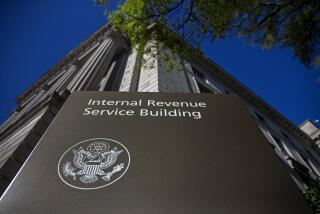Yeltsin Creates Commission to Track Down Russian Tax Dodgers
- Share via
MOSCOW — Prodded by nationwide hunger strikes and a serious threat to economic security, Russian President Boris N. Yeltsin declared war on tax dodgers Friday and said the suffering of unpaid police, teachers and soldiers is on their conscience.
Yeltsin announced the creation of a government commission to identify nonpayers and collect taxes so the millions of Russians who have not been paid for months can be compensated for the work they perform for society.
Police in the Far East, scientists in Moscow and miners in the coal-producing regions of Russia have been protesting wage delays by staging hunger strikes. Millions of others, including teachers and state medical employees, have stopped work for short periods to vent their anger.
“Payment of wages and pensions is not only a matter of politics and economics. It is a matter of conscience,” Yeltsin said in a seven-minute radio address from the Barvikha spa and hospital complex where he is resting ahead of planned heart bypass surgery. “Those who dodge taxes condemn pensioners, the army, scientists and cultural workers to a beggarly existence.”
Taxes owed to federal and local budgets across Russia have swelled to 150 trillion rubles, or almost $28 billion, the Finance and Economics ministries have acknowledged, making timely payment of state pensions and salaries impossible. But the biggest tax cheats are some of the wealthiest business enterprises in Russia, and their refusal to pay tax debts has been connected to their support in Yeltsin’s summer reelection campaign.
“More than half of the 80 trillion rubles [$14.8 billion] owed the federal government is owed by the 30 biggest industrial enterprises in the country,” said Alexander Auzen, an economics professor at Moscow State University. “Many are companies that actively supported the president during his reelection campaign, and they tend to view the tax bills they are now being presented with as ingratitude.”
Tax collection was far below expectations in the first half of this year, and it has plummeted further since the July 3 election.
The federal Finance Ministry announced last week that tax revenues were only 29% of the figure projected for the budget in the third quarter of this year. Auzen noted that individual workers have a much better record, having paid virtually all their expected taxes for the first half of this year.
Yeltsin gave few details of how collection will be tightened other than to say “tough and decisive measures” will be taken against those who fail to pay their tax debts or local officials who misappropriate funds provided for wages and pensions.
He noted that major industries have been among the worst culprits in causing the wage and pension crisis, and he accused tax authorities of “harassing honest citizens and businessmen by finding all kinds of minor faults with their reports while major dealers evade their control.”
*
One of the Yeltsin administration’s greatest successes has been in taming inflation, forcing it from a monthly average of 40% in 1992 to less than 1% a month now. Loans and credits from international lenders have been extended to Russia on condition that strict monetary policies continue, which prohibits the government from printing rubles to pay salaries and pensions.
Slumping revenue from the stalled privatization program has exacerbated the current fiscal crisis, as has the maturing of three-month treasury bills issued during the height of the presidential election campaign at staggering interest rates--as high as 250%.
An investment boom that was expected to occur after Yeltsin’s reelection has failed to materialize, largely because of his illness and concerns over who is really running Russia in the president’s stead.
Although his voice sounded strained, and at times he slurred his words, Friday’s broadcast allayed rumors that recent health problems have affected Yeltsin’s ability to speak or even, as some reports had it Wednesday--to the consternation of world markets--that he had died.
Yeltsin has handed over responsibility for some leadership matters to Prime Minister Viktor S. Chernomyrdin, who would be his temporary successor in the event Yeltsin failed to recover from the heart surgery expected in about two months.
But Chernomyrdin and Yeltsin’s chief of staff, liberal economist Anatoly B. Chubais, are confronted with a strong and unapologetic challenge for power from Security Council chief Alexander I. Lebed, leaving many Russians--and foreigners--guessing what the future holds after Yeltsin.
More to Read
Sign up for Essential California
The most important California stories and recommendations in your inbox every morning.
You may occasionally receive promotional content from the Los Angeles Times.














